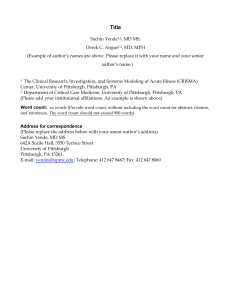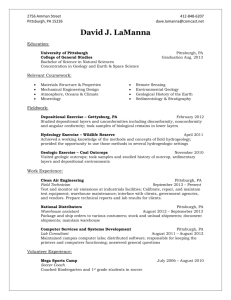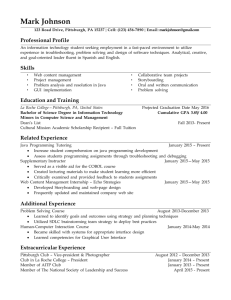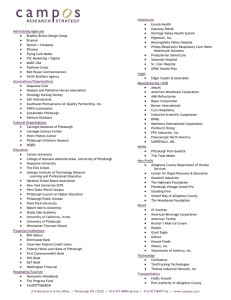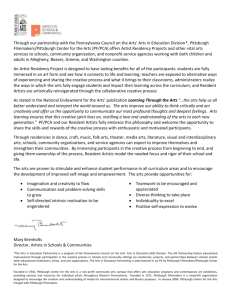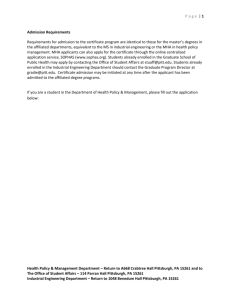2011 Copeland Program - University of Pittsburgh
advertisement
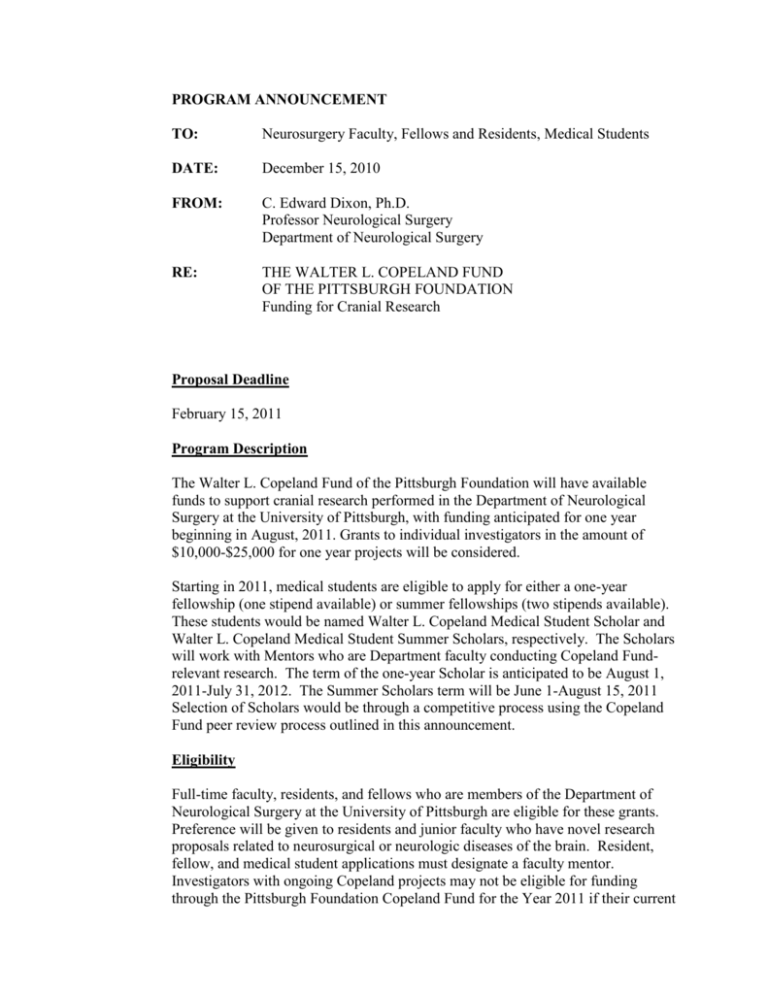
PROGRAM ANNOUNCEMENT TO: Neurosurgery Faculty, Fellows and Residents, Medical Students DATE: December 15, 2010 FROM: C. Edward Dixon, Ph.D. Professor Neurological Surgery Department of Neurological Surgery RE: THE WALTER L. COPELAND FUND OF THE PITTSBURGH FOUNDATION Funding for Cranial Research Proposal Deadline February 15, 2011 Program Description The Walter L. Copeland Fund of the Pittsburgh Foundation will have available funds to support cranial research performed in the Department of Neurological Surgery at the University of Pittsburgh, with funding anticipated for one year beginning in August, 2011. Grants to individual investigators in the amount of $10,000-$25,000 for one year projects will be considered. Starting in 2011, medical students are eligible to apply for either a one-year fellowship (one stipend available) or summer fellowships (two stipends available). These students would be named Walter L. Copeland Medical Student Scholar and Walter L. Copeland Medical Student Summer Scholars, respectively. The Scholars will work with Mentors who are Department faculty conducting Copeland Fundrelevant research. The term of the one-year Scholar is anticipated to be August 1, 2011-July 31, 2012. The Summer Scholars term will be June 1-August 15, 2011 Selection of Scholars would be through a competitive process using the Copeland Fund peer review process outlined in this announcement. Eligibility Full-time faculty, residents, and fellows who are members of the Department of Neurological Surgery at the University of Pittsburgh are eligible for these grants. Preference will be given to residents and junior faculty who have novel research proposals related to neurosurgical or neurologic diseases of the brain. Resident, fellow, and medical student applications must designate a faculty mentor. Investigators with ongoing Copeland projects may not be eligible for funding through the Pittsburgh Foundation Copeland Fund for the Year 2011 if their current The Walter L. Copeland Fund of the Pittsburgh Foundation Page 2 of 10 project has not been completed by August 1, 2011. Medical Students applying to the Walter L. Copeland Medical Student Scholars program must be enrolled in medical school. Content of Proposals The research applications should focus on diseases of the brain. Focus on neurosurgical diseases is encouraged and may include research in the following specific areas: Cerebral vascular diseases Cerebral ischemia Traumatic brain injury Neoplastic disease Infectious diseases Seizure disorders Cranial base surgery Radiosurgery Minimally invasive surgery Pediatric neurosurgical disorders Neurodegeneration Functional neurosurgery Basic science, as well as clinical research proposals, is encouraged. For basic science proposals, clinical relevance should be strongly emphasized. Evaluation Criteria The general review criteria to be used in evaluating research submissions are: 1. 2. 3. Soundness of methodology Relevance and potential impact on our understanding of the disease, improved neurosurgical treatment of the disease, and prevention or cure of the disease Originality of approach Collaborative research and multidisciplinary approaches are encouraged. Women and minority investigators as well as new researchers are encouraged to submit proposals. Approval from the appropriate Institutional Review Board/IACUC must be obtained prior to July 2011 for all proposals involving animal or human research that are recommended for funding to the Foundation. Awards The Walter L. Copeland Fund of the Pittsburgh Foundation Page 3 of 10 The number of awards will depend upon the quality and responsiveness of the proposals, but each individual award will not, except in extremely unusual circumstances, exceed $25,000 per year. Awards are permitted for direct costs only. No overhead or indirect costs will be provided. The awards should be used primarily for expendable research supplies, although a small amount not to exceed $1,200 per year may be used for travel to scientific meetings for presentation of results. In order for travel to be approved it must be included in your initial budget. These awards may not be used for the purchase of major equipment such as microscopes, HPLC machines, etc. The budget should include 1% university based salary and applicable fringe benefits of the PI. Stipends for the one-year Walter L. Copeland Medical Student Scholar and Walter L. Copeland Medical Student Summer Scholars are $24,000 and $3,000, respectively. Application Process Forms for application for the one-year Walter L. Copeland Medical Student Scholar accompany this memorandum and are available in Dr. Dixon’s office. The application deadline is February 15, 2011. The grant proposal must follow the directions on the application kit and should not exceed page limits. The completed application and checklist must be received in Patricia Quirin’s office via electronic mail no later than 5:00 PM on February 15, 2011. Please send all electronic applications as a PDF file to quirinpt@upmc.edu. All applications will be reviewed by an Internal Review Committee chaired by Dr. C. Edward Dixon and made up of faculty in the Department of Neurological Surgery as well as representatives from the Pittsburgh Foundation. During the Internal Review Committee meeting, the applications will be critically reviewed according to the evaluation criteria previously described. They will be given a priority score using the NIH system and those applications with the highest priority scores will be recommended for funding up to the total amount of Foundation money available. However, no application considered to have inadequate methodology, relevance, impact or originality will be approved. If sufficient high quality applications are not received, all of the funds available may not be distributed. Recommendations for funding will then be sent to Dr. Robert Friedlander, Chairman of the Department of Neurological Surgery, for his review. Dr. Friedlander will have the authority to disapprove or reduce funding for recommended applications, but may not approve applications not recommended by the Internal Review Committee. In the beginning of April, 2011, Dr. Friedlander will submit the approved applications with the recommended funding for each to the Pittsburgh Foundation with a copy to Mr. Clyde Jones at the University of Pittsburgh, before their June, 2011 meeting. Formal receipt of Notice of Award from the Pittsburgh Foundation for those applications judged eligible by the Pittsburgh Foundation is expected by July 15, 2011, and monies for initiation of the The Walter L. Copeland Fund of the Pittsburgh Foundation Page 4 of 10 approved grants are anticipated to be available at that time. This timeline is subject to change by the Pittsburgh Foundation. Project Guidelines The project start date is determined by when the award is received from the Pittsburgh Foundation by the University of Pittsburgh and shall run 1 year from that date. No project is to begin until the award has been received by the University of Pittsburgh. Any money remaining at the end of the project must be returned to the Pittsburgh Foundation unless a no cost extension is submitted and approved by the Foundation. Funds may not be transferred between investigators/projects. If any manuscripts, abstracts, book chapters, etc. are produced as a result of your funded research by the Pittsburgh Foundation, Walter A. Copeland Fund, then the Pittsburgh Foundation requests that they be cited in your written work and a copy forwarded to them for presentation to the Board of the Copeland Fund. Progress Reports All investigators who have been awarded funds throughout the Walter A. Copeland Fund of the Pittsburgh Foundation are required to submit progress reports to Dr. Dixon’s office to then be forwarded to the Pittsburgh Foundation at the end of the year of research for which they had been funded. It is emphasized that no investigator will be eligible to receive subsequent funding from the Pittsburgh Foundation without the timely receipt of such progress reports. Mentors of resident and fellow investigators bear ultimate responsibility for progress reports by their mentees. Final Report All investigators who have been awarded funds throughout the Walter A. Copeland Fund of the Pittsburgh Foundation are required to submit a final report to Dr. Dixon’s office to then be forwarded to the Pittsburgh Foundation at the end of the year of research for which they had been funded if the project has been completed. It is emphasized that no investigator will be eligible to receive subsequent funding from the Pittsburgh Foundation for a new project without the timely receipt of such final report. Mentors of resident and fellow investigators have further responsibility for final reports by their mentees. The Walter L. Copeland Fund of the Pittsburgh Foundation Checklist A completed checklist with requested documents must be submitted with the application or the project will not be considered for funding. Source of Funds The Walter A. Copeland Fund of Pittsburgh Foundation Inquiries Questions regarding this request for application should be directed to: Patricia Quirin Department of Neurological Surgery 3520 Fifth Avenue, PARKV 202 Pittsburgh, PA 15213 Telephone number: 412.802.6497. Facsimile number: 412.802.6405. Email: quirinpt@upmc.edu Page 5 of 10 The Walter L. Copeland Fund of the Pittsburgh Foundation Page 6 of 10 DEPARTMENT OF NEUROSURGERY GRANT APPLICATION DEADLINE: February 15, 2011 The Walter L. Copeland Fund of the Pittsburgh Foundation Funding for Cranial Research TITLE OF PROJECT: PRINCIPAL INVESTIGATOR: TITLE OF P.I.: CAMPUS ADDRESS: SCHOOL: DEPARTMENT: PHONE NUMBER: FAX NUMBER: E-MAIL ADDRESS: ABSTRACT: (Description of the project, including a one sentence justification and followed by a summary of your hypothesis and specific aims. The majority of the summary should be the strategies or techniques employed to address the specific aims and the summary should conclude with expected results and significance of those results.) MAXIMUM of 300 words. KEY PERSONNEL: (Include degrees, position title, department, phone/fax number and email address). Also include letters of support from each collaborator. DETAILED BUDGET: (The budget should include 1% university based salary and applicable fringe benefits of the PI. Costs should be applied toward animal purchase or care, and lab equipment. A $1,200 limit for travel and for preparation of slides may be included. If you do not budget for travel initially, it will not be approved later. Except under very unusual circumstances, you should not request more than $25,000. The budget should be planned for a oneyear project.) NO SUPPORT FOR MAJOR EQUIPMENT WILL BE PROVIDED. BUDGET JUSTIFICATION: (Briefly summarize your justification for the categories that you are requesting.) The Walter L. Copeland Fund of the Pittsburgh Foundation Page 7 of 10 BIOGRAPHICAL SKETCH Provide the following information for the key personnel in the order listed on Form Page 1. Photocopy this page or follow this format for each person. NAME POSITION TITLE EDUCATION/TRAINING (Begin with baccalaureate or other initial professional education, such as nursing, and include postdoctoral training.) INSTITUTION AND LOCATION DEGREE YEAR(s) FIELD OF (if STUDY applicable) RESEARCH AND PROFESSIONAL EXPERIENCE: Concluding with present position, list, in chronological order, previous employment, experience, and honors. Include present membership on any Federal Government public advisory committee. List, in chronological order, the titles, all authors, and complete references to all publications during the past three years and to representative earlier publications pertinent to this application. If the list of publications in the last three years exceeds two pages, select the most pertinent publications. DO NOT EXCEED TWO PAGES. OTHER SUPPORT RESOURCES AND ENVIRONMENT Laboratory: Clinical: Animal: Computer: Office: The Walter L. Copeland Fund of the Pittsburgh Foundation Page 8 of 10 Other: MAJOR EQUIPMENT: RESEARCH PLAN (maximum of 10 pages excluding references) SPECIFIC AIMS: BACKGROUND AND SIGNIFICANCE: PRELIMINARY STUDIES: RESEARCH DESIGN AND METHODS: HUMAN SUBJECTS: (If human subject investigation is being used, please provide a very brief summary of precautions taken to assure safety of your methods and provide a statement that IRB approval has been obtained or is pending. Also include a copy of your IRB approval letter. If human subjects are not being used, type “nonapplicable” below.) VERTEBRATE ANIMALS: (If vertebrate animal investigation is being used, please provide a very brief summary of precautions taken to assure safety of your methods and provide a statement that approval has been obtained or is pending. Also include a copy of your Institutional Animal Care & Use Committee approval letter. If vertebrate animals are not being used, type “nonapplicable” below.) LITERATURE CITED: (Please provide a summary of the literature used annotated in your research plan.) LAY DESCRIPTION: (Please provide a description in lay language not to exceed one paragraph in length) The Walter L. Copeland Fund of the Pittsburgh Foundation Page 9 of 10 THE WALTER L. COPELAND FUND APPLICATION CHECKLIST TITLE OF PROJECT: PRINCIPAL INVESTIGATOR: MENTOR (if Applicant is a resident or fellow): PROJECT YEAR: 1. APPLICATION Abstract (Maximum 300 words) Key Personnel-letters of support from each collaborator Detailed budget-direct costs only Biographical Sketch (Maximum 4 pages) Other Support Resources and Environment Research Plan (Maximum 10 pages excluding references) Specific Aims Background and Significance Preliminary Studies Research Design and Methods References Human Subjects, if clinical study IRB letter attached Vertebrate Animals, if laboratory study utilizing vertebrate animals IACUC approval letter Literature Cited Lay Description 2. Project Continuation (If more than 1 grant year project) Progress Report filed 3. Project Conclusion Final Report filed 4. New Application for Continuation of Previous PI’s Project The Walter L. Copeland Fund of the Pittsburgh Foundation Project Justification All Progress Reports filed for previous project and attached All Final Reports filed for previous project and attached 5. I have read and understand the Copeland Guidelines Page 10 of 10
